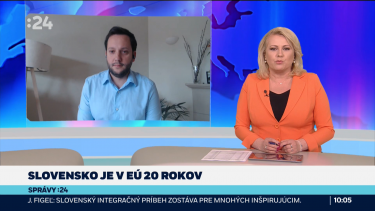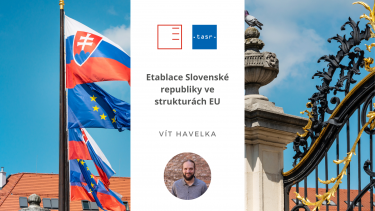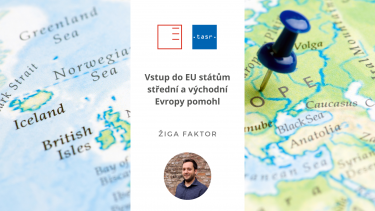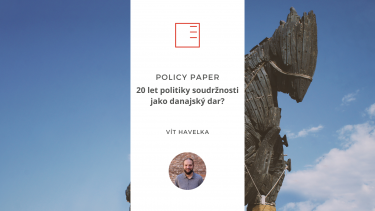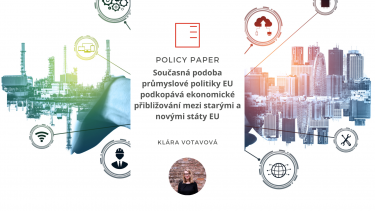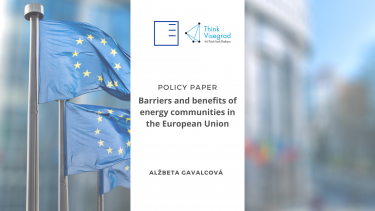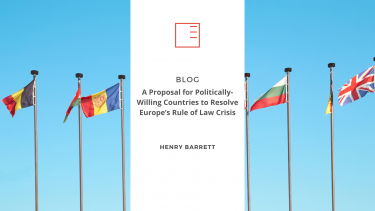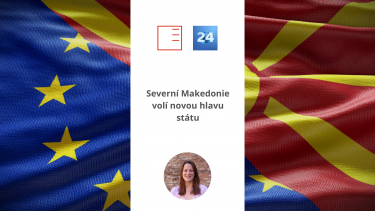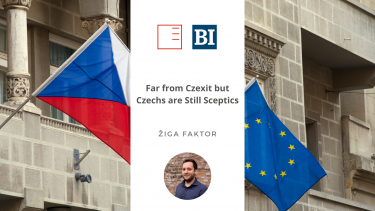RTVS | Slovakia has been in the EU for 20 years
Slovakia joined the European Union 20 years ago in its biggest enlargement to date. Among the main benefits of this move is an increase in the economy, up to 80%. Žiga Faktor, deputy director and head of EUROPEUM Institute's Brussels office, described the future direction of the Union.
Zjistit více
TASR | Establishment of the Slovak Republic in the EU structures
Twenty years ago, the European Union underwent its biggest enlargement with the addition of ten Central and Eastern European countries. According to Vít Havelka, Senior Research Fellow at EUROPEUM Institute, this is enough time for all accession countries to learn how to navigate the EU institutions and its decision-making process.
Zjistit více
TASR | EU accession helped Central and Eastern European countries
In 2004, a total of ten new countries joined the European Union, the largest enlargement in terms of population and number of countries. EU accession has helped the countries of Central and Eastern Europe, especially in terms of economic growth and political stabilisation. Žiga Faktor, Deputy Director of EUROPEUM Institute and Head of the Brussels Office, commented on this topic.
Zjistit více
Policy Paper | 20 years of cohesion policy as a "Beware of Greeks bearing gifts"?
It has been 20 years since the Czech Republic and 9 other Central, Southern and Eastern European countries joined the European Union. This was on the promise of increased prosperity and the so-called economic catching-up of the post-communist part of Europe. Cohesion policy was to play a key role here. Vít Havelka writes in his Policy Paper.
Zjistit více
Policy paper | Current EU industrial policy undermines economic convergence between old and new EU countries
The post-communist states of Central and Eastern Europe, including the Czech Republic, joined the European Union at the height of globalisation and the dominance of the so-called Washington Consensus policies. However, the global economic crisis of 2008 showed shortly afterwards that these policies had their limits. Read more in Klára Votavová's Policy Pepeu.
Zjistit vícePolicy Paper | Barriers and benefits of energy communities in the European Union
Energy communities are an effective means to decentralize and renew our energy systems with sustainable solutions as they are usually based on renewable energy. They have already started emerging in 1970´s, yet there has been a significant increase in their development only in recent years, also in terms of their introduction into the EU legislation. Especially in Western and Northern European countries the concept already enjoys vast popularity. On the other hand, in Central and Eastern European countries (further referred to as CEE) energy communities are only beginning to emerge. The policy brief (based on literature and interviews with various stakeholders ) examines the benefits energy communities may bring, and more importantly, the main obstacles remaining in their way for greater evolution in the CEE region – and especially Visegrad countries (V4). As these initiatives progress, sharing the best practices will ensure the success of the community energy in the energy transition. Writes Alžbeta Gavalcová.
Zjistit vícePolicy Paper | Barriers and benefits of energy communities in the European Union
Energetické komunity jsou účinným prostředkem decentralizace a obnovy našich energetických systémů pomocí udržitelných řešení, protože jsou obvykle založeny na obnovitelné energii. Začaly se objevovat již v 70. letech 20. století, avšak k jejich výraznému rozvoji došlo až v posledních letech, a to i z hlediska jejich zavedení do legislativy EU. Zejména v zemích západní a severní Evropy se tato koncepce již těší velké oblibě. Naproti tomu v zemích střední a východní Evropy (dále jen SVE) se energetická společenství teprve začínají vytvářet. Tento politický brief (založený na literatuře a rozhovorech s různými zúčastněnými stranami ) zkoumá výhody, které mohou energetická společenství přinést, a především hlavní překážky, které jim stále stojí v cestě k většímu rozvoji v regionu střední a východní Evropy - a zejména v zemích Visegrádské skupiny (V4). Jak tyto iniciativy postupují, sdílení osvědčených postupů zajistí úspěch komunitní energetiky v energetickém přechodu. Píše Alžbeta Gavalcová.
Zjistit víceBLOG | A Proposal for Politically-Willing Countries to Resolve Europe’s Rule of Law Crisis
Given the lack of adequate EU responses over rule of law violations, politically-willing European states ought to consider a novel accountability mechanism. It is high time for committed European states to take innovative and decisive action on more than a decade of democratic backsliding sweeping the region and the world. Should European Union Member States concerned about rule of law violations seek a solution outside the EU institutions? Our researcher Henry Barrett, a Fulbright-Schuman Grantee, writes about this topic in his blog.
Zjistit víceČT24 | Northern Macedonia elects new head of state
Polls opened in North Macedonia on Wednesday for the first round of the presidential elections. Seven candidates are running for the presidency in a country gripped by political tensions, disappointment with democratic reforms and aspirations to join the European Union. Jana Juzová, a senior researcher at EUROPEUM Institute, analysed the situation in an interview for ČT24.
Zjistit víceBalkanInsight | Far from Czexit but Czechs are Still Sceptics
This year the Czech Republic celebrates 20 years since joining the European Union. Czechs are very sceptical about the EU, despite the fact that about 70 percent acknowledge that the Czech Republic benefits from EU membership and would vote to remain. Sceptical perceptions of the Union could be changed by the country's new pro-European leadership. Žiga Faktor, head of the Brussels office and deputy director of the EUROPEUM Institute, commented on this topic for BalkanInsight.
Zjistit více
Staroměstské náměstí 4/1
Praha 1 - Staré Město
110 00
tel.: +420 212 246 552
email: europeum@europeum.org
https://www.europeum.org
